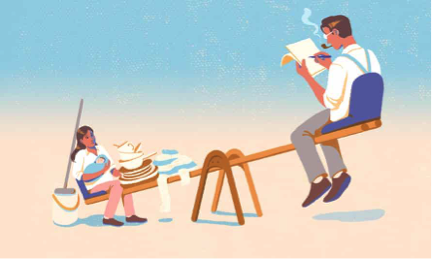“Now my belief is that this poet who never wrote a word and was buried at the cross-roads still lives. She lives in you and in me, and in many other women who are not here to-night, for they are washing up the dishes and putting the children to bed.” (Virginia Woolf)
Who’s Afraid Of Virginia Woolf?
It is with urgency that I invoke Virginia Woolf, although she is writing this in 1929. Virginia Woolf’s A Room of One’s Own is one of the most important works in the domain of Feminist literary criticism. It addresses the debate relating to women and fiction writing. Drawing attention to the reasons that ‘prevent’ women from venturing into writing. The patriarchal structures that transcend along the lines of cultural, economic, educational boundaries for women. Few of the many reasons that prevent women from realising their creative potential. To write fiction, as Woolf is suggesting, requires money and a room of their own. This invariably is hinting at a space that should exist for women, with financial independence. Both, interdependent on time. It is opening up multiple gateways of debates that are still relevant with respect to “women’s time”.
Double Burden – Pressuring a woman’s body & mind
We divide a women’s life into ‘neat’ timelines. Beginning from puberty, pregnancy, lactation and finally, menopause, is the traditional outlook that our society imposes upon her. Limiting her identity only to her reproductive phases.
Arlie Hochschild coined the word “Double Burden” or “Second Shift”. It refers to the workload borne by women working. Women working full-time at paid jobs while also discharging responsibility for a significant portion of unpaid care work. This leads to unequal distribution of labour and also of time and mental load. Alluding to women’s inability to ‘think’ is a misogynistic trope. It comes with a belief system that their lives are led through their bodies, and the work that the society demands of them.
Broken Scales of Uneven Domestic Labor Distribution

One can perceive this as a balancing act with men and women on either side of a measuring scale. Women bear a higher burden of work due to the constant household chores. Not only with the multiplicity of tasks but also the entire ‘act’. Mopping, cleaning, ironing, utensils, cooking, child-care, along with the (at times) invisible emotional discomfort drained of support that she, too, requires as a woman, as an individual. If she gives, she needs it as well.
In January 2021, one of the manifesto of a political party in Tamil Nadu in India promised of remunerating women for their ‘unpaid’ domestic work. While it sounded as though a welcome ‘change’, the opinions stood sharply divided. A centuries old debate of monetarily “valuing” a woman’s unpaid domestic work. It is being again brought out of a gunny sack, albeit in a presumptuously loaded manner. Most worry about – “how will we evaluate a woman’s care-work? Is this a progressive public policy scheme? One that ‘compensates’ women for their unbridled, unceasing efforts at the home front? This further deeply roots the household duties as a ‘woman’s only’ job.
The problematic notion that women belong within the households comes to the fore. And “now” that there is a possibility of their unpaid “work” to be remunerative does not sound catchy or enterprising. It rather pushes women deep into the margins of gender inequality. It is an evident fact that there exists a disproportionately high burden on women who carry out unpaid work. The very tenets of distributing the household tasks between men and women stand nullified. As women are being ‘shown’ their way back into the households through these seemingly ‘progressive’ policies. Much ‘wow’ to acceptance of women’s ‘work’ as ‘work’ and not well, ‘second nature’.
Working or Housewife: A Myth?
Another important agenda that comes into the forefront is of the “full-time working women”. Women who work full-time in offices, and also carry out a double-shift when they return home. There is no curtailment on their part of household work despite the full-time jobs. Where, too, they work alongside the male workforce in tandem. If the current electoral promise fails to recognize their efforts how will they be compensated for their “double-burden”?
When we push women back into the households, we limit their agency of choice to step out and seek employment. We are limiting their role to the traditional status of that of a mother, wife, sister and a “home-maker”. Neglecting their individual identity as a woman. By not involving men into the household chores and keeping women out of financial decisions we are gendering roles.
We need to open up discussions on “how” to narrow down disparities between men and women participating household chores equally. Unfortunately our policies reek of gender bias. We are still a country where the representation of women in political spaces is negligible and tokenistic. It further widens this gap pushing the efforts of all these years down the gutter. Celebrating or welcoming as a wise policy decision hinders the possibility of creating an equitable and gender-just inclusive society.
Dignity of Livelihood and Mutual Respect
A large chunk of working women are dependent on domestic house-helps. It provides them with a support equivalent to emotional, physical and mental ease to an extent. A dual disparity is created. On one hand the househelp’s opportunity to earn livelihood with dignity and respect is in doldrums. Their informed choice of stepping out in order to create an individual identity as a “working woman” gets hindered. Secondly, the employer woman who is also working full-time, the burden amplifies hampering her own career opportunities. Monetising care-work is extremely difficult to quantify because the economies of each household vary widely. The size of each household, number of members, age-groups that require different attention and care, are a few among many differences that exist in India.
An eventual productivity gap will confine women to household chores. While the financial burden over men would increase defeating the very idea of diluting gender inequalities. It becomes essential to divide the work. In such a manner that it creates dignity and respect between men and women, and in the society
About The Author

Ayushi Mehta (She/Her) is a masters student of Gender Studies at Ambedkar University, Delhi. She is an intersectional feminist and is passionate about women’s rights, gender, & policy related research. A trained Bharatanatyam dancer, who swears by Faiz’s couplets. Follow her on Twitter
Image Source: FreePick
